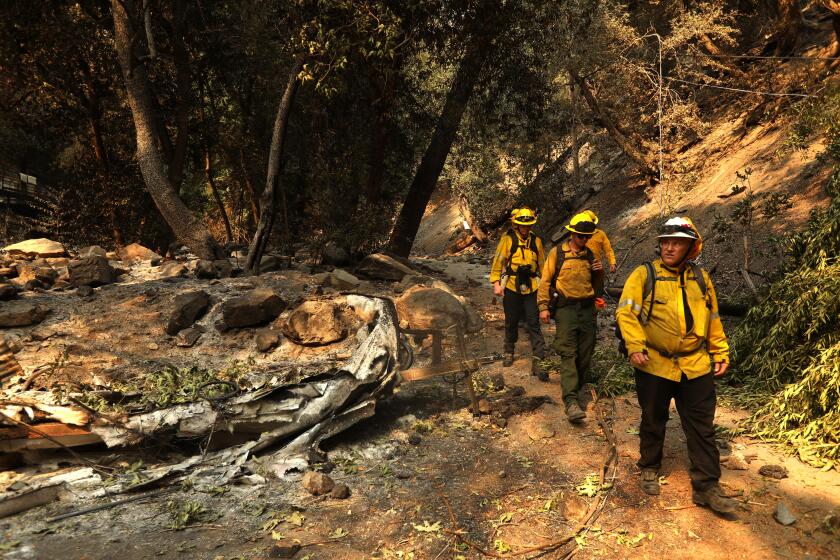Newsletter: Gun-loving America’s bloody new normal
Good morning. I’m Paul Thornton, and it is Saturday, Feb. 17, 2018. Happy Kosovo Independence Day. Let’s take a look back at the week in Opinion.
Here’s a challenge: Go way back to before this past Wednesday, and try to remember the last school mass shooting that dominated an American news cycle. It may be an impossible task, not only because Wednesday’s school shooting in Parkland, Fla., is on everyone’s mind, but also because mass murder has become too common in the United States for most people to distinguish one incident from another.
This was a challenge posed in a Los Angeles Times editorial this week after the Parkland shooting, in which 14 teenagers and three adults were shot to death by a man wielding an AR-15-style assault rifle. Just like those past tragedies, this one will likely fade from our collective memory, as mass shootings in a society awash in gun violence are just another part of our American life:
When does an epidemic stop being an epidemic and become just a basic part of regular life? It's been 19 years since the nation was horrified by the carnage at Columbine in suburban Denver. It's been just over five years since the Sandy Hook Elementary School shooting. Quick: What was the most recent mass shooting incident (at least four wounded) at a school before the one on Wednesday? Here's the sick part: There have been so many school shootings that it takes a bit of work to answer what should be an easy question.
Already the folks who support gun control (which includes us) are fuming about the ready availability of firearms in our society. Already the pro-gun folks are pooh-poohing those who think guns are integral to shooting deaths. "Guns don't kill people, people do," they like to say. The accurate phrasing should be, "Guns don't kill people, people with guns do." At an astonishing rate, a depressing rate, a stomach-churning rate. ...
This is what America is today: bloody. The Florida shooting too shall pass, as did Columbine, Sandy Hook, Santa Monica College and so on — all allowed to fade into the backdrop of American memory without a thing being done. This is us. Until we decide finally, forcefully, effectively, that it is not.
Every possible solution to mass shootings would involve a major trade-off. Do we further restrict people’s access to firearms, violating their 2nd Amendment rights? Do we demand that news organizations withhold coverage, and therefore publicity, from the killers, raising 1st Amendment concerns? Should we try to intervene before the shootings take place, possibly violating due process? Dan McLaughlin writes that each solution would punish very large numbers of people to stop only a tiny handful of individuals from committing crimes. L.A. Times
It isn’t what you learn in college; it’s that you get decent grades and a degree. Students have long known about higher education what the experts don’t: that the point of enrolling in college isn’t to learn an employable skill, but to graduate and therefore signal to potential employers that you’re reliable and smart enough to finish school, writes economics professor Bryan Caplan. “Few of us use history, poetry, higher mathematics or foreign languages after graduation,” he says. “The main reason firms reward education is because it certifies (or ‘signals’) brains, work ethic and conformity.” L.A. Times
When New York sends people to L.A., it’s not sending its best. From where did Los Angeles get $14 cocktails, gourmet burritos and exponentially increasing rents? Ann Friedman, herself a transplant to the Best Coast, bemoans the gentrification and expensive tastes that new arrivals often bring to already established neighborhoods in Los Angeles. “If we expect immigrants to adapt to their new home while making it their own, we should expect the same of internal migrants,” she writes. L.A. Times
A federal court’s message to Trump: Be quiet. Once again, a federal court has rejected the constitutionality of the latest version of the president’s travel ban. And once again, it’s about what Trump has said about Muslims, which the court ruled betrays the president’s discriminatory intent and makes the ban unconstitutional. Michael McGough, himself no fan of any of the president’s travel bans, warns that the U.S. Supreme Court may see things differently. L.A. Times
Reach me: paul.thornton@latimes.com
Sign up for The Wild
We’ll help you find the best places to hike, bike and run, as well as the perfect silent spots for meditation and yoga.
You may occasionally receive promotional content from the Los Angeles Times.




